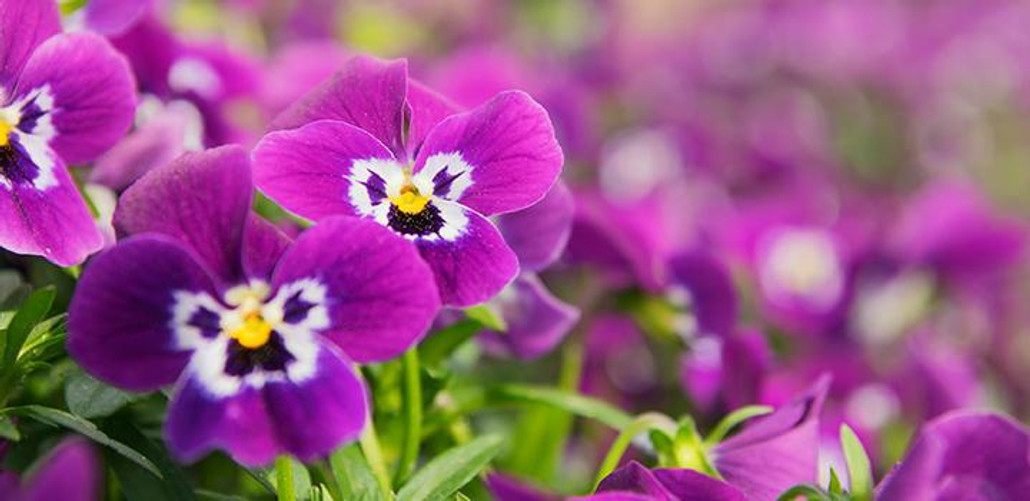
Planting Primroses & Pansies
Posted by Grange Co-op on 15th Feb 2018
Get some early color in your planters. Now is the time to plant pansies and primroses! In this GrangeKnows article, we’ll provide information regarding each flower’s specific planting needs.
 PANSIESThese Spring annuals are available in a variety of colors, ranging from soft pastel tones to bold and bright colors. The word pansy comes from the French pensée which means "thought," as if the plant resembles someone who is in deep thought, with a lowered head. Pansies are known for their contrasting whiskers or blotches in the center of their petals, when in bloom can resemble a face. Spring pansies prefer a sunny or partly shaded location. Spacing can be about eight inches apart, or closer if you prefer. As the weather warms, pansies will form more buds.
PANSIESThese Spring annuals are available in a variety of colors, ranging from soft pastel tones to bold and bright colors. The word pansy comes from the French pensée which means "thought," as if the plant resembles someone who is in deep thought, with a lowered head. Pansies are known for their contrasting whiskers or blotches in the center of their petals, when in bloom can resemble a face. Spring pansies prefer a sunny or partly shaded location. Spacing can be about eight inches apart, or closer if you prefer. As the weather warms, pansies will form more buds.
 PRIMROSESThe quaint primrose features bright flowers held together in tight clusters that are extremely attractive to honeybees. Stout and tucked together, they often resemble a handheld bouquet. Primroses prefer a shaded spot shielded from direct sunlight, keeping the soil moist and cool. They are generally a perennial and once established—usually this is within 2 – 3 years—the plant can be divided into clumps, pulled apart by hand and replanted. Consider transplanting after flowering. Generally, this is done in early autumn.
PRIMROSESThe quaint primrose features bright flowers held together in tight clusters that are extremely attractive to honeybees. Stout and tucked together, they often resemble a handheld bouquet. Primroses prefer a shaded spot shielded from direct sunlight, keeping the soil moist and cool. They are generally a perennial and once established—usually this is within 2 – 3 years—the plant can be divided into clumps, pulled apart by hand and replanted. Consider transplanting after flowering. Generally, this is done in early autumn.
Primroses and pansies provide a dash of color and warmth to any environment. To keep them healthy, it is important to provide a nutrient rich and well-draining soil compost to increase and promote healthy flowers. We recommend G&B Purely Compost for all soil types. This organic compost improves soil environment and is the ideal topdressing to apply for increasing plant vitality.
WHY DOES COMPOST PREPARE THE SOIL FOR SUCCESSFUL FLOWER GROWTH?
 Providing G&B Purely Compost around your newly planted flowers not only keeps them healthy, but gives a nice look to landscaping and reduces maintenance as well. G&B Purely Compost has ingredients including: tomato skins, almond shells, rice straw and hulls, bark fines, composted dairy manure, composted chicken manure and seabird guano. Compost helps to lessen moisture-loss from evaporation, keeps the soil well aerated, and reduces water runoff and soil erosion. Compost shields against rainwater splashing fungi from the soil onto the plant, which can result in increased likelihood of soil-borne diseases. Furthermore, it creates a more stable environment for increased populations of earthworms and soil microorganisms.
Providing G&B Purely Compost around your newly planted flowers not only keeps them healthy, but gives a nice look to landscaping and reduces maintenance as well. G&B Purely Compost has ingredients including: tomato skins, almond shells, rice straw and hulls, bark fines, composted dairy manure, composted chicken manure and seabird guano. Compost helps to lessen moisture-loss from evaporation, keeps the soil well aerated, and reduces water runoff and soil erosion. Compost shields against rainwater splashing fungi from the soil onto the plant, which can result in increased likelihood of soil-borne diseases. Furthermore, it creates a more stable environment for increased populations of earthworms and soil microorganisms.
Compost returns valuable nutrients to the soil, which maintains ground quality and fertility. Essentially compost acts as a mild, slow release natural fertilizer, improving plant growth without burning plants, like traditional chemical fertilizers. Compost is generally more economical in comparison to other soil amendments and microbe boosters; however, it works similarly by dramatically increasing natural nutrients in the soil.
For advice on your gardening questions, visit any of our Grange Co-op locations to speak with a Grange Gardening Expert!
